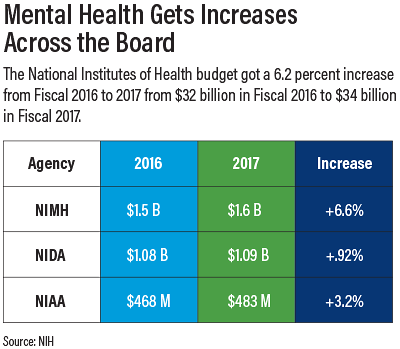When the U.S. House of Representatives and U.S. Senate voted in favor of passing a $1.1 trillion federal spending package last month, it signaled significant good news for medicine in general and mental health and psychiatry in particular.
In a rejection of the White House proposal to cut $1.2 billion from the budget of the National Institutes of Health (NIH), Congress pushed through a bipartisan deal that increased funding for NIH. Passage of the legislation, which was signed by President Trump on May 5, averted a government shutdown and provides funding through September, the end of Fiscal 2017.
Overall, the Department of Health and Human Services (HHS) was appropriated $2.8 billion more than in Fiscal 2016, mostly due to the $2 billion increase for NIH. With that increase, the total appropriated to NIH through September is $34 billion, a 6.2 percent increase.
The mental health institutes under NIH are also winners in the budget: the National Institute of Mental Health (NIMH), the National Institute on Drug Abuse (NIDA), and the National Institute on Alcohol Abuse and Alcoholism (NIAAA) all received funding increases (see table).
Among the research areas benefiting from passage of the package are Alzheimer’s disease, the Precision Medicine Initiative, and the Brain Research through Advancing Innovative Neurotechnologies (BRAIN) Initiative. They received increases of, respectively, $400 million, $120 million, and $110 million.
The Substance Abuse and Mental Health Services Administration was given a total budget of $3.6 billion, including $650 million over Fiscal 2016 to address the opioid crisis. This represents an increase of $150 million for prevention and treatment programs for opioid and heroin use disorders, as well as $500 million in funding authorized by the 21st Century Cures Act.
The funding level for the Substance Abuse Prevention and Treatment Block Grant has been maintained at $1.8 billion, while the Mental Health Block Grant funding was increased from $533 million to $563 million.
“The federal government and the Congress play a vital role in advancing research into the causes of, and new treatments for, mental health and substance use disorders,” said CEO and Medical Director Saul Levin, M.D., M.P.A. “The increased funding that Congress has appropriated this year gives us renewed hope that people with mental illness and substance use disorders will one day benefit from the growing understanding of mental disorders and new, personalized health and treatment options. We sincerely appreciate Congress considering our requests for additional funding for those governmental entities helping those with mental illness and substance use disorders get the best treatment and care through research.”
Ariel Gonzalez, APA’s chief of government affairs, agreed. “We were pleased to see that the budget for HHS has been increased $2.8 billion above the Fiscal 2016 level. We will continue to advocate for additional funding to address the needs of those impacted by mental health issues and those in need of substance use disorders treatment.” ■


